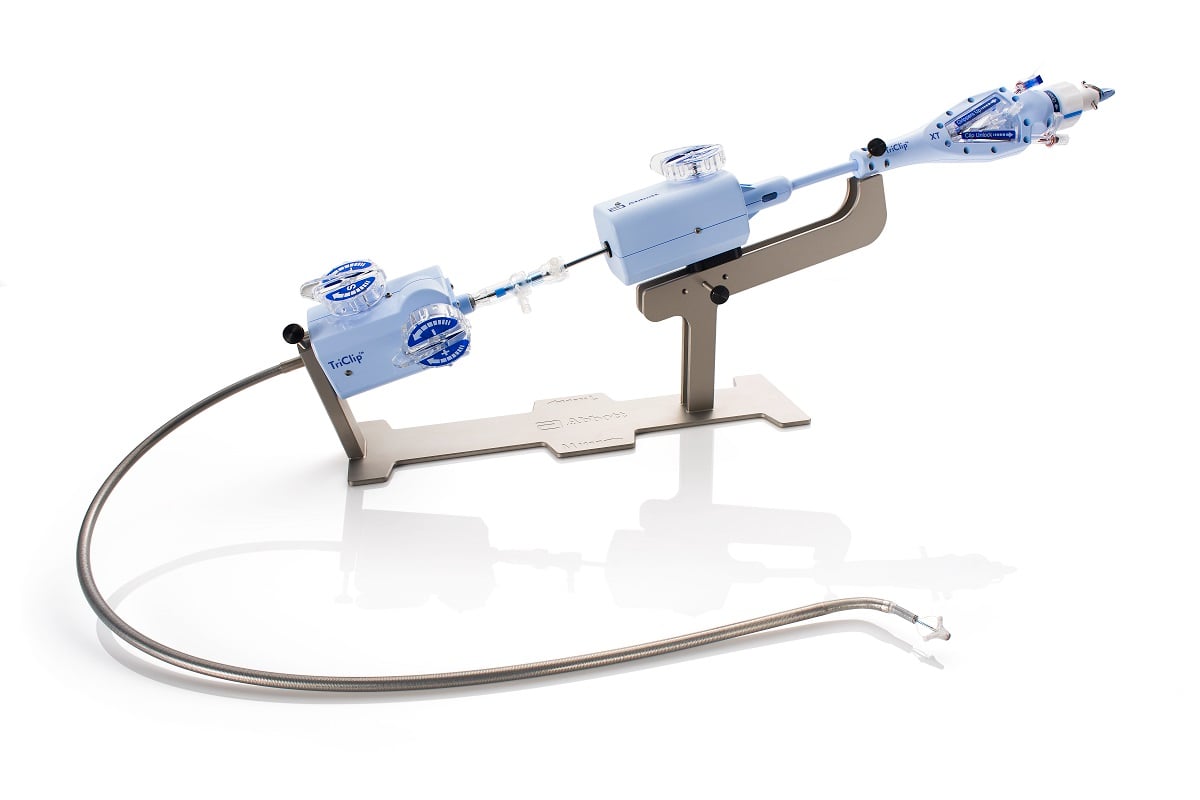预约演示
Abbott's TriClip heart implant receives FDA approval for tricuspid valve repair
2024-04-02
临床结果上市批准AHA会议临床研究

Preview
来源: FierceBiotech
In Abbott’s randomized clinical trial, 90% of patients that received a TriClip implant saw improvements in their regurgitation levels within 30 days, with reductions maintained for at least one year. At the same time, 98% reported no major adverse events within those first 30 days.
Stopping leaks in the heart’s tricuspid valve has been a notoriously tricky fix, but, now, the FDA is handing out its second approval for a dedicated, minimally invasive therapy in as many months.
Abbott has obtained a long-awaited green light for its TriClip repair implant. Based on the company’s top-selling MitraClip device, but tailored for the tricuspid’s more complex anatomy, the TriClip is designed to reinforce the valve that separates the heart’s right-side atrium and ventricle by grasping and holding together its flaps and helping form a tighter seal.
When leaks in the valve cause blood to flow backward through the heart, a condition known as tricuspid regurgitation, the cardiac muscle has to work harder. Patients can develop fatigue and shortness of breath, as well as peripheral edema and other symptoms of right-sided heart failure if it is left untreated.
The TriClip—described as a transcatheter edge-to-edge repair, or TEER system, and threaded into the heart through a vein in the leg—is aimed at patients in need who may not be able to withstand the strains of open heart surgery. Abbott estimates that over 1.6 million people in the U.S. may have tricuspid regurgitation.
“This approval helps address a treatment gap for people with tricuspid regurgitation who previously had few options to treat a disease that adversely impacted their daily lives and could lead to other deadly conditions,” Sandra Lesenfants, senior VP of Abbott's structural heart business, said in a statement.
The TriClip has received regulatory approvals in Europe, Canada and other countries; Abbott said it has since been used to treat more than 10,000 people.
In the company’s randomized clinical trial, 90% of patients who received a TriClip implant saw improvements in their regurgitation levels within 30 days, with reductions maintained for at least one year. At the same time, 98% reported no major adverse events within those first 30 days.
In mid-February, an outside advisory committee convened by the FDA examined the TRILUMINATE trial’s results, as well as other TriClip data, and voted 13-to-1 that the implant’s safety profile showed that its benefits outweighed the risks.
TRILUMINATE had met its primary endpoint, with TriClip outperforming a control group receiving medical therapy across a composite measurement of death, hospitalizations and repeated tricuspid surgeries. Participants also reported improvements in outcome scores through a quality-of-life questionnaire.
The FDA’s approval follows the early February nod delivered to Edwards Lifesciences for its Evoque transcatheter valve replacement.
Unlike the TriClip, the Evoque completely supplants the heart’s native tricuspid valve with a self-expanding frame and edge-sealing skirt. A prior study showed that, out of 150 patients, 98.8% saw their tricuspid regurgitation levels reduced to at least the “moderate” category after six months, while 93.8% reached at least the “mild” grade. Evoque previously scored a European approval last October.
更多内容,请访问原始网站
文中所述内容并不反映新药情报库及其所属公司任何意见及观点,如有版权侵扰或错误之处,请及时联系我们,我们会在24小时内配合处理。
靶点
-药物
-生物医药百科问答
全新生物医药AI Agent 覆盖科研全链路,让突破性发现快人一步
立即开始免费试用!
智慧芽新药情报库是智慧芽专为生命科学人士构建的基于AI的创新药情报平台,助您全方位提升您的研发与决策效率。
立即开始数据试用!
智慧芽新药库数据也通过智慧芽数据服务平台,以API或者数据包形式对外开放,助您更加充分利用智慧芽新药情报信息。




